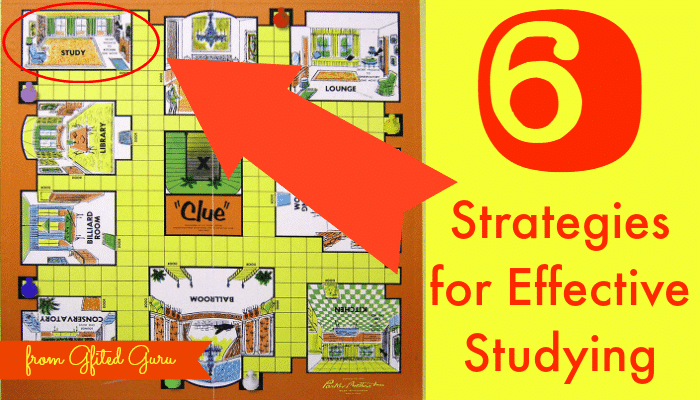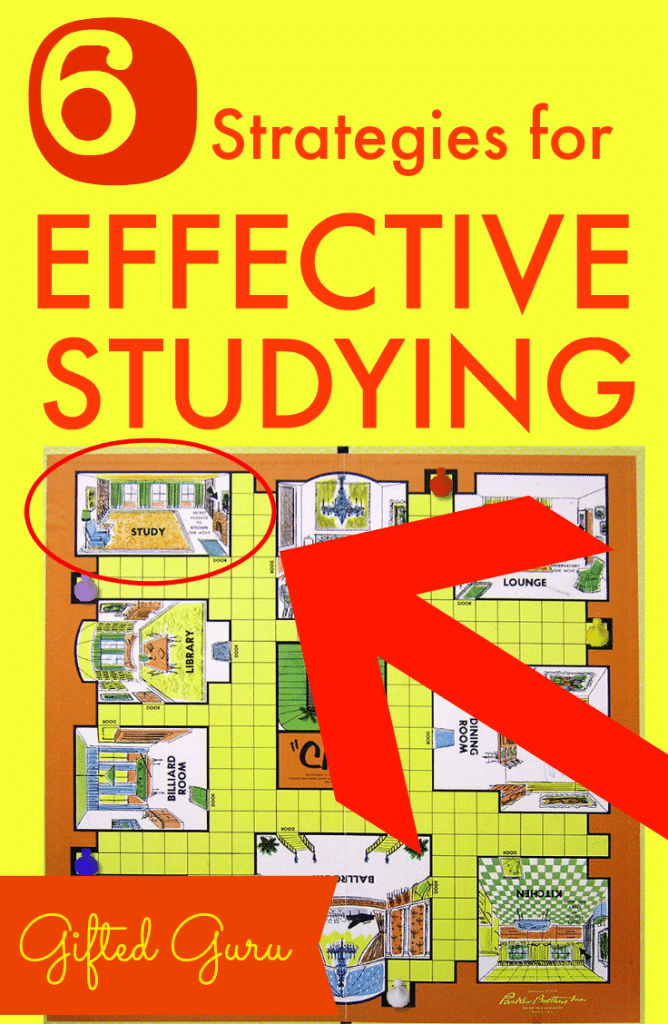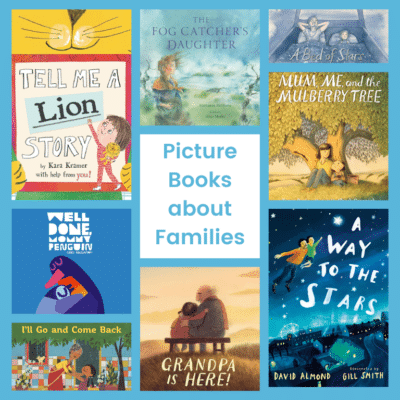I’ve compiled this list of 6 strategies for effective studying just for you.
You know who you are. You don’t like studying. In fact, when people suggest that you study, you’re not completely sure what they mean.
Study? Isn’t that the room where Colonel Mustard was with the candlestick in Clue?
As a gifted kid, studying is a sticky wicket. We don’t have to do it as often as more typical learners, so sometimes we have poor habits. Or, you know, no habits. Just sayin’.
So, this list of 6 strategies for effective studying is for you. From me. You’re welcome.
Let’s do this the smart way, shall we? I’m going to include all of the strategies research shows us are effective, because if we’re going to do it, let’s do it smartly. Or at least smartly-ish.
6 Strategies for Effective Studying
1. TEST YOURSELF
Washington University in St. Louis did a study to figure out if it’s more effective to study flashcards taking out the cards you’ve mastered or leaving them all in and studying the ones you know and don’t know together.
They found something surprising: it didn’t matter at all. What DID matter was frequent testing that kept all of the words fair game in all of the quizzes.
It turns out that one of the most effective study techniques is to give yourself mini-test experiences.
To do this, try:
- Creating actual or virtual flashcards and then practicing them. Quizlet is one place to do that.
- Do any problems you can find in the textbook or online.
- Take practice tests.
2. SHORT SPRINTS: NO MARATHONS
Cramming does not work. What does work is what is called “Distributed Practice” – practice spread out over time.
It’s actually better to focus for thirty minutes on one thing and then move to a different topic and spend thirty minutes on that than to cram the same topic for three hours in a row.
It’s also much, much better to study material fifteen minutes a day over two weeks than it is to study six hours in a row, right before the test. That sends your short-term memory into Defcon 1.
To do this, try:
When you sit down to study, list out everything you need to study and how long it should take. Divide it out with a scheduled time for each thing, taking into account other things on the agenda (dinner, soccer practice, etc.).
For example, let’s say you’ve got math homework (problems), English homework (reading and vocabulary), and science homework (studying for a test).
Your plan might look like this:
4:00 – 4:30: Math problems and five minute break
4:30 – 4:45: Make vocabulary flash cards
4:45 – 5:00: Read book for English
5:00 – 6:00: Set table and eat dinner
6:00 – 6:30: Create ten questions about the science chapter. Explain the questions and answers to dad.
6:30 – 7:30: Soccer practice
7:30 – 8:00: Shower and read for fun
8:00 – 8:30: practice vocab flash cards and do any remaining math problems
(You’ll see later why these specific strategies are listed)
3. GRAB A COOL PEN AND A PIECE OF TOAST
There’s no research that cool pens make for great study sessions, but we DO know that anything that brings you pleasure raises dopamine levels in the brain, and dopamine DOES help studying (it makes you stick with stuff – it’s a motivator). So, go ahead, grab that gel pen you love in the name of science.
Grab a snack, too, while you’re at it. We know that protein is great before workouts, but for brain workouts, low-fat carb snacks are best.
To do this, try:
- Rather than stock up on a bunch of supplies you love, get them over time. That’s more likely to give you that dopamine feeling.
- If green is your favorite color, feel free to use all green flashcards, green pens, green folders, green sticky notes, and anything else you can get in green.
- Grab a piece of toast and get to work.
4. MAKE IT HARD
The harder you can make it, the more likely you are to remember it. That sounds crazy, but it’s called “Desirable Difficulty,” and this is what researchers have found out: If you learn things easily, there’s a high chance they’ll flow right back out of your brain with the same ease in which they came in.
When you have to work harder to learn something, your learning becomes what researchers call “effortful,” and that effortfulness (I just made that word up – don’t you love English?) makes it more likely to stick with you long-term.
Gifted kids often think that if something feels hard, it means they’re not smart. The opposite turns out to be true: the harder you work to learn, the more likely it is you’ll keep it.
To do this, try:
- Practice it before you’ve mastered it. Start testing yourself on material before you fully know it. That sounds counterintuitive, but it means that you’ll be working harder.
- Study in different locations (not always in the same place). This is a little challenge to the brain.
- Stick with things that feel hard, even though that’s uncomfortable.
- Start with the hardest questions first, so do the spelling words you don’t know and answer the math problems at the end of the assignment.
5. TAKE STRATEGIC BREAKS
It’s important to take breaks, but you have to make sure you’re really studying during the study times. Don’t let your mind wander for an hour and then decide it’s time for a break.
Imagine that it’s like weight-lifting: you want to lift hard for a few sets, and then rest those muscles.
Breaks can be bio- breaks (snacks, restroom), or they can be just doing something else. As my Gramma says, “A change is as good as a vacation.” Switch the subject you’re studying for a little break.
To do this, try:
- Build breaks into your schedule.
- Break your studying up into different segments of different content, rather than just “study” in general.
- Keep in mind that even chores or practice count as a break from studying. Sorry.
6. DO THE PREP WORK
You’ve got to focus on taking in the information if you are going to study it later. One reason gifted kids sometimes find it hard to study is that they were tuned out like a bad radio during the instruction or during the initial reading.
What happens then is that they get home and don’t have anything TO study. Notes? Um, about that….
Make sure you’re mindful about initial reading, instruction or note-taking.
To do this, try:
- Use Cornell Notes. Cornell notetaking is a specific kind of notetaking. Like anything else, it may feel awkward at first, but it is a fantastic strategy for giving you ideas of exactly WHAT to study when you’re reviewing notes. Since that’s gifted kids’ number one problem, they’re worth mastering. Learn how to set them up and use them here or here. Trust. me.
- Read carefully, and read a few times during initial instruction. Read text once to get a framework in your mind, and then read a couple of more times to solidify the information in your mind. This is not studying – this is initial learning. Studying is reviewing already-learned information.
- Pay attention to the teacher. You don’t have to like him/her, but that person is creating the test, soooooooo…..
WRAP UP
It turns out that the HOW of studying is as important (probably more) as the amount of time spent studying.
Creating what researchers call “retrieval practice” (fancy term for quizzes/tests) opportunities is one of the absolute best strategies there is for effective studying, so use those Cornell notes you took or those flashcards you made and test yourself smart.
In fact, to test yourself on how well you learned these tips, go back to Tip #2, look over the schedule there, and name three reasons that schedule would be effective.
How’d you do?
I promise: with these 6 tips for effective studying, you are on your way to smart studying.
This is post one in a three-post series. Next up: 7 Things Not to do while Studying.
Spoiler: you’re not going to like it.
Why are you still reading? Go study!






